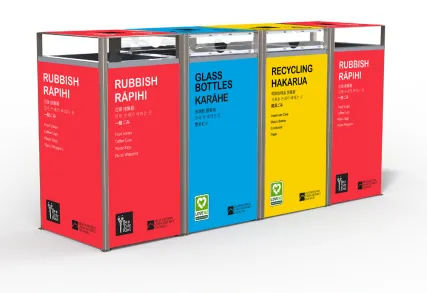 A recycling trial will begin this month in Whakatāne, with the aim of reducing the amount of waste going to landfill from public places.
A recycling trial will begin this month in Whakatāne, with the aim of reducing the amount of waste going to landfill from public places.
The new concept bins involved will incorporate features to make it easier for people to separate recyclable items from general waste, including nationally consistent bin colours, clear signage in English and te reo Māori, and WiFi technology to reduce overflow and make collection systems more efficient.
The Whakatāne District is one of a small number around the country to have been successful in applying to be part of this trial. The campaign has been developed by The Packaging Forum, which promotes recycling under the Government’s Love NZ brand, and The Auckland Litter Prevention Steering Group, which manages the Be a Tidy Kiwi brand.
The installation of nine recycling stations will begin this month at the following locations:
- Boon Street
- Esplanade Mall
- Whakatāne i-SITE
- Rex Morpeth Park
- McAlister Street Carpark
- West End
- Mahy Reserve (large and small station)
- Maraetōtara Reserve
As part of the trial, existing rubbish bins in the area of the new stations will be covered over, and have messaging to direct people to the nearest recycling station. The recycling stations will each have four bins – two red bins for general rubbish (including food scraps, coffee cups and plastic wrappers); one yellow bin (for paper, plastic bottles and aluminium cans); and one blue bin (for glass bottles).
Whakatāne District Council Manager Solid Waste Nigel Clarke says the trial offers many benefits, but its success relies on people doing the right thing and 'putting litter in its place'.
"Residents have been asking for public bins to match our kerbside collection system, so we’re pleased to be offering this system and hope to see some positive results through reduced landfill waste volumes," Mr Clarke says. "This is a great opportunity to change our behaviour around rubbish and recycling, and have a positive impact on our natural environment."
The recycling stations are expected to be operational by the end of February.